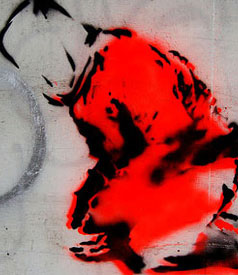
|  |  |  Editorials | Opinions | September 2009 Editorials | Opinions | September 2009  
It's Not Just About Waterboarding
 Lt. Col. Barry Wingard, t r u t h o u t Lt. Col. Barry Wingard, t r u t h o u t
go to original
September 29, 2009


| | Although waterboarding has been the topic of much of the discussion, less attention has been given to other forms of torture used on detainees at Guantanamo Bay prison. (OpenDemocracy/flickr) |  |
In a speech earlier this year, former Vice President Dick Cheney said waterboarding and other brutal torture techniques were only used on detainees of the highest intelligence value - the so-called worst of the worst.

But Cheney's claims are untrue.

Fayiz Al-Kandari is a Kuwaiti citizen detained at Guantanamo Bay, Cuba. He never possessed information known only to the "worst of terrorists" and he wasn't part of the Jack Bauer ticking time-bomb scenario often used to justify enhanced interrogations. Yet, he was still abused over the course of many years while in US custody.

Al-Kandari went to Afghanistan in 2001 to provide humanitarian aid. Like every Arab in Afghanistan, he fled when US air strikes began in earnest in the fall. In late 2001, Al-Kandari was captured by Afghan forces and sold into US custody, where he has remained for nearly eight years.

Al-Kandari recalls that while he was in US custody in Kabul in December 2001, he was shackled in various stress positions for as long as 36 hours at a time. He was beaten with hands and instruments including a chain and a plastic hose to prevent bruising. Throughout his ordeal, Al-Kandari was photographed; unfortunately, those photographs cannot be shown "for your protection."

In early 2002, Al-Kandari was transferred to Bagram and held in a roofed tent with no sides, where overnight temperatures typically reached below freezing. In additional to the physical assaults, Bagram was most memorable for threats with weapons and sleep depravation. Photographs again documented his condition, but they have never been released.

An American interrogator told Al-Kandari there was no evidence against him and he would soon be freed. Instead, he was transferred to Kandahar in early 2002. There his entire body was shaved (except for a cross on his chest, which was later shaved off after several photos were taken) and he was initially kept awake in solitary confinement for five straight days. The abuse continued and resulted in broken ribs and severe bruising observed, by medical personnel months later in an "oh well" kind of manner.

According to Fayiz, the new techniques in Kandahar included use of a stun gun and sexual humiliation by female guards. Standard operating procedure for interrogations would be for guards to assault - or "soften up" - Al-Kandari before the interrogator entered the room. Guards, usually in groups of two to six at a time, would then remain in the room during the interrogation.

This treatment lasted for approximately two months until May 2002, when Al-Kandari was transferred to Guantanamo. Before being placed on a plane out of Kandahar, his sound-proof headgear was lifted and a female voice whispered, "You are going to hell in GTMO." At the time, he was drugged, his head sandbagged, and he was placed into a head harness for the extremely painful 24-hour trip.

At Guantanamo, he was again shackled into stress positions for extended periods of time. He was also urinated on and subjected to sleep deprivation, strobe lights, ear-piercing music, cell extractions, and extreme heat and cold conditions in his cell via temperature controls, and, of course, the female interrogations to challenge his Muslim faith.

All told, Al-Kandari has been interrogated approximately 400 times and abused throughout the time he was in US custody. And to what end? A Department of Defense legal review of Al-Kandari's case found the evidence against him "is made up almost entirely of hearsay evidence recorded by unidentified individuals with no firsthand knowledge of the events they describe."

In short, the US learned nothing of value from its abusive treatment of Al-Kandari, and in all likelihood exculpatory materials confirming Al-Kandari's whereabouts and accounts of abuse will be classified and withheld from public view.

Al-Kandari, and others like him who were not waterboarded, must not fall through the cracks of the interrogation debate. Dick Cheney insists that enhanced interrogations were only used on "hardened terrorists" after other efforts failed, that such efforts prevented the deaths of thousands, and that the US never lost its moral bearings in its treatment of detainees. Al-Kandari is living proof that Cheney is wrong on all counts and awaits his day in court eight years later. |

 |
|  |



